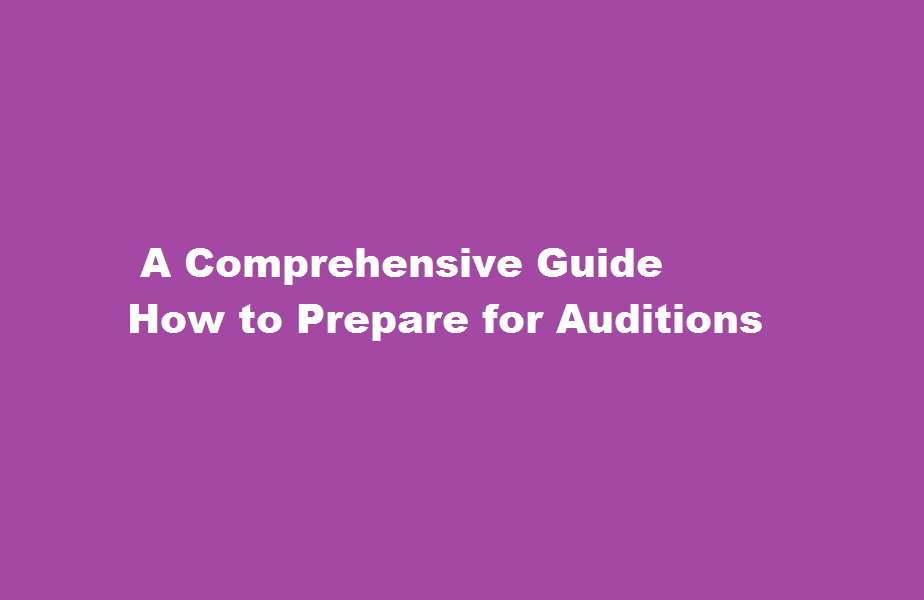A Comprehensive Guide How to Prepare for Auditions
4 min read
Introduction
Auditions can be nerve-wracking experiences, but with proper preparation, you can enhance your chances of success. Whether you’re auditioning for a play, a music recital, or a role in a film, thorough preparation is crucial. This article will provide you with a comprehensive guide on how to prepare for auditions effectively. From selecting and rehearsing your material to developing confidence and mastering performance techniques, these tips will equip you with the tools to showcase your talent and stand out from the competition.
Choose the Right Material
Selecting the appropriate material is vital to make a positive impression. Research the requirements and expectations of the audition and choose material that aligns with the role or genre. For acting auditions, study the script and select a monologue that showcases your range and captures the essence of the character. For musical auditions, pick a song that highlights your vocal abilities and suits your vocal range. Choosing the right material allows you to demonstrate your strengths and abilities effectively.
Thoroughly Prepare Your Piece
Once you’ve selected your material, invest time in understanding and dissecting it. Break down the text or song, analyse the emotions and intentions, and identify any subtext. Memorise your lines or lyrics thoroughly to ensure a smooth and confident performance. For acting auditions, develop a backstory for your character to enhance your portrayal. Practise your piece repeatedly, focusing on delivery, timing, and expression. By being fully prepared, you’ll be able to showcase your skills with confidence and authenticity.
Research the Production
Gain as much knowledge as possible about the production, director, or organisation holding the audition. Research their previous work, style, and vision to align your performance accordingly. Understanding the context and expectations can help you tailor your audition to fit their requirements. For music auditions, familiarise yourself with the style and repertoire of the composer or the band. For acting auditions, explore the genre and watch performances of similar works. This research will enable you to make informed choices and demonstrate your understanding of the project.
Seek Feedback and Rehearse with Others
Rehearsing with others and seeking feedback is invaluable. Find a trusted mentor, acting coach, or music teacher who can provide constructive criticism and guidance. They can help you refine your performance, offer insights, and suggest improvements. Participating in workshops or joining a local theatre group can also provide opportunities for collaboration and feedback. Rehearsing with others allows you to receive different perspectives and fine-tune your performance, enhancing your overall audition readiness.
Develop Confidence and Control Nerves
Nervousness is natural before an audition, but managing it is crucial. Develop techniques to calm your nerves, such as deep breathing exercises, visualisation, or meditation. Rehearse your audition in front of a mirror or record yourself to assess your body language and facial expressions. Confidence comes from knowing your material, so focus on the aspects you excel at and remind yourself of your strengths. Embrace the audition as an opportunity to share your talent rather than viewing it as a high-stakes evaluation.
Frequently Asked Questions
What to expect at your first audition?
Your initial audition will just be with the casting director and potentially a reader. Group auditions for film are rare but not unheard of. Be friendly and polite, but keep it professional; you’re there to do a job not to impress anyone. If you have any questions, ask them before the camera starts rolling.
What are the 4 basic acting skills?
What are the 4 Types of Acting? The four major types of acting techniques include Classical Acting, Stanislavski’s Method, Method Acting, and Meisner Technique.
Conclusion
Preparing for auditions is a multifaceted process that requires dedication, focus, and attention to detail. By choosing the right material, thoroughly preparing your piece, researching the production, rehearsing with others, and developing confidence, you can enhance your audition performance significantly. Remember that auditions are not solely about the end result but also about showcasing your passion, talent, and unique interpretation. Approach each audition as a learning experience and an opportunity for growth. With time, patience, and consistent practice, you’ll improve your audition skills and increase your chances of success in the competitive world of performing arts.
Read Also : Essential Steps to Repair Your DSLR Camera






